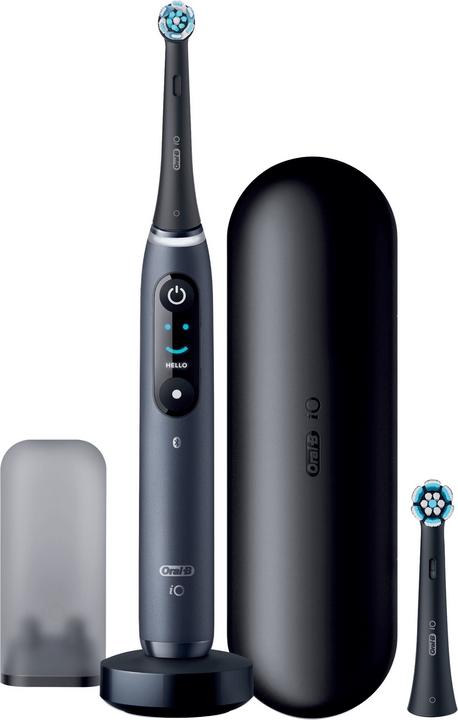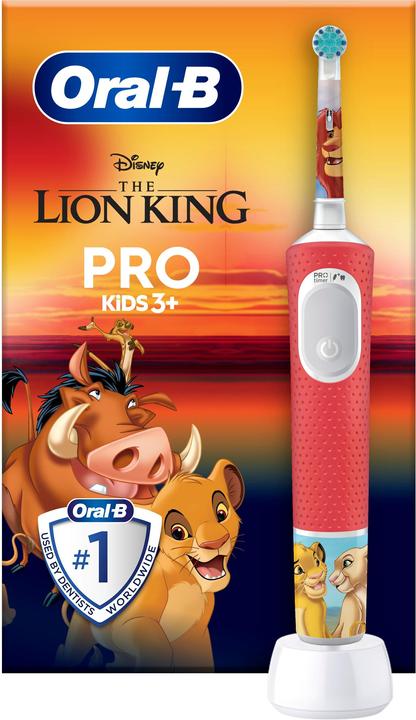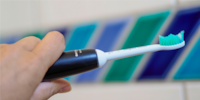

«Ultimately, you’ll end up with more teeth in your mouth!»
Does an electric toothbrush always beat a manual one? What should you consider when choosing a toothbrush, and what about apps and supposed miracle toothpaste? My interview with Professor Michael Noack covered all these questions and more.
We all have to brush our teeth, and we should do it regularly. The price for poor dental hygiene doesn’t show immediately. But once it does, it’s usually painful and expensive. Adverts regularly pitch products that are supposed to keep our teeth clean and healthy. And each one is – of course – much better than the last. So, what could be better than asking an expert?
The expert in question is Michael Noack, who was chair and director of the Department of Conservative Dentistry and Periodontology at the University of Cologne until 2021. He was also editor-in-chief of a dental journal from 1993 to 2010.
Some of my friends swear by their manual toothbrushes. They say it’s much gentler. What does science say about the electric v. manual toothbrush debate?
That’s actually a fascinating question. When I was studying dentistry, electric toothbrushes weren’t recommended. But now the data is clear. My colleagues at the University of Greifswald started an interesting project almost 20 years ago, conducting a thorough examination of patients and asking them at the outset which toothbrush they regularly used. They asked again after five and eleven years.
And the result?
It was clear: those who used an electric toothbrush generally had less biofilm and plaque in their mouths, as well as less gum disease. But even more spectacularly, they had fewer cavities, fewer fillings and fewer visits to the dentist.
The biggest conclusion is that after eleven years, those who used an electric toothbrush had more teeth in their mouths.
Better let the experts decide
So, the superiority of electric toothbrushes is scientifically proven. So, do I need to switch to one?
You don’t «have» to switch. People who brush their teeth diligently and go for regular checkups can stick with a manual toothbrush, provided their dentist doesn’t diagnose bleeding or plaque.
However, in my experience, 80 to 90 per cent of the patients in my waiting room suffer from residual plaque in critical areas, bleeding or decay changes. So, if you absolutely prefer to use a manual toothbrush, it’s best to ask your dentist about your current dental situation.
Rotating or sonic brush?
Our conversation then takes us deeper into the world of electric toothbrushes. There are only two models on the market whose effectiveness has been extensively scientifically proven.
- The first category is made up of sonic toothbrushes. «Sonic» doesn’t mean these toothbrushes are loud. Instead, a transducer transmits vibrations to the brush head, which moves sideways. This also creates a dynamic flow of fluid that breaks down plaque.
- Models with a rotating-oscillating brush head have been on the market for considerably longer. They look a bit like dental instruments. The brush’s motion removes plaque from teeth.
But if both systems have proven their effectiveness, which one should I choose?
If you go tooth by tooth in front of a mirror and work very carefully, a rotating toothbrush has benefits. However, you have to be careful not to scrub over the gums. If you don’t want to concentrate on brushing, switching to a sonic toothbrush is easier. They have an elongated brush head and a gentle motor. The sound doesn’t damage teeth, but it does remove biofilm.
Everyone has between 28 and 30 teeth. This means that in two minutes of brushing time, up to 60 tooth surfaces (outside and inside) need to be cleaned. That’s just two seconds per tooth surface. The elongated brush head of a sonic toothbrush is more effective here, as it touches more than one tooth.
What about high-tech brushes with cameras and AI?
The market for electric toothbrushes is constantly evolving. We’re now starting to see models with a camera integrated into the brush head with images analysed by AI. Is this the future of dental care?
From a purely technical perspective, it’s impressive. The question is: is it really needed? We currently have eight billion people on earth who need to brush their teeth twice a day. That’s 16 billion brushes per day. AI seems less likely to be the answer when it comes to creating a socially acceptable solution for the masses. Toothbrushes like these are showpieces, like Lamborghinis. Nice to look at, but who wants to drive to work in one?
Toothpaste myths: which one should you use?
According to Professor Noack, science also has a clear answer when it comes to choosing a toothpaste. There’s no substitute for fluoride. At least, my interviewee isn’t aware of any scientific study that proves someone has remained healthy long-term without fluoride toothpaste.
He cites China as an example, where fluoride-free toothpastes have a 30 per cent market share. Large studies show that Chinese people who use them also have almost 30 per cent more cavities, even though sweets aren’t as established in their diet.
What about special toothpastes that promise to whiten or even repair teeth? Is that even possible? Can tooth enamel be restored after brushing?
Not in the generally understood sense. It’s possible that a few small crystals might be detected on the tooth in the lab. But this is unlikely to be considered buildup. Abrasives in toothpaste should also be avoided from a medical perspective. While they’re supposed to facilitate the removal of biofilm, they actually cause wear.
And what about other «miracle products»?
There are also toothpastes that contain wellness ingredients or are a special colour. If you’d rather spend nine euros on a tube instead of three, you can. But there’s still no substitute for fluoride.
A clear result
The professor’s conclusion is clear: an electric toothbrush offers the best chance of maintaining oral health. Even a mid-range model is worthwhile. And the price and maintenance costs are always cheaper than dental treatments.
Hamburg local, bookworm, and ice hockey fan. Dad and granddad. Constantly tinkering around with my smart home setup. I love DIY, the outdoors, fashion, and cosmetics.
Practical solutions for everyday problems with technology, household hacks and much more.
Show all






